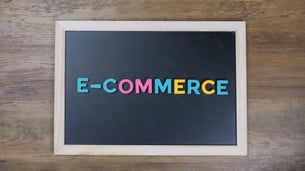The development of the e-commerce industry is expanding its scope every year. More and more people are becoming convinced to shop online. Large selection, time saving express delivery are just a few reasons that speak in favour of web purchasing. Also, the Covid-19 pandemic contributed to the popularization of online shopping. But the real game changer has been mobile apps that can be downloaded to any smartphone.
Statista.com predicts that mobile commerce will be valued at $432 billion in 2022. This is almost 3 times more than in 2018, which shows the development with the years. Such numbers work on the imagination of many entrepreneurs. So, it is no wonder that many businesses decide to develop their own mobile app for sales purposes.
Table of Contents:
1. Benefits of having your own e-commerce application.
1.1. Opportunities arising from having an e-commerce app.
1.2. Disadvantages of having an e-commerce app.
2. What to consider when creating a shopping app?
2.1. How to make money from mobile commerce?
2.2. What does the future hold for mobile shopping?
3. Railwaymen has in portfolio e-commerce applications.
Benefits of having your own e-commerce application
An interesting look at this topic is shown by outerboxdesign.com. The portal reports that up to 79% of smartphone users have made a purchase from their device in the last six months. For this reason, creating mobile apps focused on user experience seems logical. Mobile shopping translates into achieving various business goals. As a result, e-commerce website can influence user engagement, increase conversions and build brand loyalty.
Developing an ecommerce app also impacts the customer. A positive shopping experience makes shoppers want to use the tool again for some time. Retailers to encourage users to use their app are opting for many ways. Social media, push notification, or modern technologies like augmented reality (AR) are just a few examples. The shopping process itself through the mobile application convinces users.

Opportunities arising from having an e-commerce app
Nowadays, any mobile device can turn into an e-commerce tool. Retailers are aware of this and focus on customer experience, simple interface and quick purchase process when developing a mobile app. Digital marketing is a big factor that helps in customer acquisition. Today, traditional advertising doesn't have the same impact as social media campaigns that people use every day.
Mobile app development can be a prescription for retailers when their online store is facing an overload. With increased sales channels, shoppers are given more options to complete their purchases. For customers, the credibility of native app that prompts them to download it is the presence in trusted sources such as Google Play Store or Apple App Store. After all, it is all about the security of mobile devices and, most importantly, data and cash.
Disadvantages of having an e-commerce app
Despite appearances, having a mobile app doesn't have to be all idyllic. While on the surface rivalry may seem motivating, when every company in our industry encourages you to download an app it can work the opposite way. Customers may then feel so bogged down by sales messages that they won't want to try your tool.
Another obstacle is often the long time it takes to write an application and the high cost of producing it. Not always such an investment translates into profits. Therefore, when deciding about app development, you need to have an idea for its distribution. Access to special promotions or discounts for app users are just examples of how to engage customers in shopping with mobile devices.
What to consider when creating a shopping app?
Many people are involved during mobile application development. Programmers, designers, testers - they are responsible for developing a solution that will meet your expectations and interest buyers. A perfect app development should involve creating a solution that will be a game changer for the owner. It can be product personalization, availability in many operating systems, or interesting graphic design.
Put yourself in the role of the user and understand his expectations. Ask a question - what will make people reach for my solution? Will it be an integration with mobile wallet or maybe a product comparison engine enabling the best buy? There is no single golden mean that can guarantee success. That is why it is worth having support in the form of e.g. analytical tools, which will give you a broader perspective on each app user.

How to make money from mobile commerce?
Mobile commerce is not just about online stores. There are many business models for which a mobile phone is necessary. These models can be based on subscription principles. The division into freemium and premium content is often used, for example, in streaming apps or modern press. Profits from recurring user payments in exchange for unique content is a common practice. Ecommerce business owners earn from display ads by app users. In that case, revenue is generated on a per-click (CPC) or per-view (CPM) basis.
What does the future hold for mobile shopping?
The future looks very promising for purchases made by mobile devices. Jmango360 already reports in its research that mobile app users spend 90% of their time on apps and the remaining 10% on websites. The predictions also apply to social media, which will influence e-commerce more with each passing year. Social selling, or the ability to generate sales through social apps, will drive the sales spiral. However, just relying on predictions is not enough because the role of owners is also to follow trends and skillfully use them.

Railwaymen has in portfolio e-commerce applications
One of our projects for the e-commerce industry was The Perfect Room. It's a digital marketplace that allows you to create your dream room using quality products available on the platform. Our task was to develop an application that would enable comfortable shopping and navigation. Moreover, we paid special attention to user experience, which gives the user an opportunity to store their favorite products in the collection. The Perfect Room is integrated with analytical tools, thanks to which collecting data about user preferences is simple. The shopping process is convenient for people from different corners of the United States because of the AvaTax system. It enables accurate tax calculation based on the relevant zip codes in a particular region.
Visit The Perfect Room Case Study or view our other app projects.


%20(1).jpg)



